A couple of weeks ago while wandering the fetid wastelands of Facebook, I came across a post by my friend Irene/Glasse Witch. If you’ve ever seen the Bernie Sanders meme where he’s once again asking for donations, it was kind of like that. Except instead of asking for donations, Irene once again posted about her practice of choosing an intention word for the coming year and invited us all to participate.
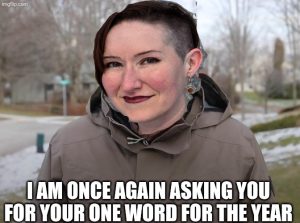
You can read more about this from Irene at her blog. She’s much more sensible than I am, and is absolutely not Bernie Sanders in disguise.
Much like the Sanders meme, there was something soothing in seeing Irene’s annual “One Word” post. No sooner had I clapped my eyes on it, than I felt something inside me relax. And for a few precious moments, the world felt a little less uncertain and slightly more predictable. Safe. Without realizing it, those annual posts had become one of the many tiny, but no less mighty, anchors in my world.
If “Irene’s One Word” were a D&D Spell, it would belong to the category of transmutation. It does, after all, take specific collections of letters (themselves bags of holding for meaning) and make guiding stars of them as well.
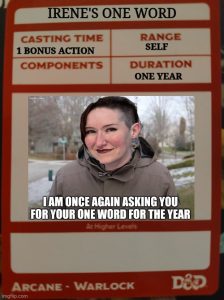
So naturally, I tapped out a quick comment.
“My word is ‘unhinged,’” I replied.
That probably sounded like trolling, but those words spilled from my fingertips with my whole chest.
A few seconds later though, I added a follow-up to explain what I’d actually meant. You see, growing up neurodivergent in the 80s and 90s, I got used to tucking away the weirder, more feral parts of myself to only maybe sorta fit in. ADHD was something American kids had on TV, and Rain Man was the only kind of autistic. Back then, you were just an obsessive, bizarre kid with the vocabulary of a “posh Victorian bitch” who pretty much lived on the naughty table at school and came up with ideas like “I should try walking to London” and “Maybe we could rock climb through that gorge with these mountain bikes?”
(In case any of you were curious, I give both of those activities a tentative 3/10.)
So is it really any wonder that “unhinged” became somewhat synonymous with those hidden-away pieces of self?
Maybe, maybe not. But most folks would probably use the word “authenticity” for that kind of thing.
Well…to a point. Pied Pipering a bunch of other kids into walking to London with me that one time was clearly a bad thing.
Authenticity Hunger in an Ersatz World
Hope for me has always been as dangerous as it is nourishing; I keep a cautious ember alive at best. Since Irene’s post though, I’ve seen others express that same desire for greater authenticity again and again. I’m seeing it so frequently now, it’s a struggle to keep that ember from bursting into flame.
Has our culture finally grown sick of this dystopian hellscape full of AI slop, propaganda, and online personalities who are more brand than actual people?
Time will tell, I suppose.
Fair warning, but this next part is probably going to sound like bullshit unless you know my kid. Around seven years ago (and I know this because I just checked FB memories), she randomly informed me that “Reality isn’t real. Reality is fake news.” She was all of four years old at the time, but there she was, sitting on the floor with her coloring book and crayons, laughing her little head off at the whole thing.
Startling statements and my kid go together like PB&J.
Clearly, the “fake news” part of it had come from overhearing adults discussing current events. It was after all 2018, and she’s always understood more than most kids her age. As for the rest of it, she either put it together for herself or it surfaced—as many of her statements often do—from goodness only knows where.
Usually when she does this, I encourage her. I ask her questions to try and flesh out where she’s coming from, then follow along to see where her thoughts next lead. Children often notice things that most adults miss or have been trained out of seeing.
I no longer remember where that conversation went, but my daughter was essentially right. This thing we call “reality” <em>isn’t</em> real—at least not in the way that most think.
However, I am old enough to remember a time when that unrealness was, or still felt, mostly organic—a world with the space to be authentic instead of constantly curated and always “on.”
This ersatz unrealness makes avatars of us all.
The Organic Unrealness Of Reality
“How might authenticity look for me, and how would I recognize it?”
Those were the two questions I began with at the start of this journey. While I knew this would likely be a process of separating the “wheat” from the “chaff,” I’m also well aware that the chaff is everywhere and, even worse, has its tricks. It’s very well-practiced in convincing humans that it’s wheat.
In the end, I decided my quest for authenticity was also really a search for that organic unrealness as well, and that is where I begin here too.
First and foremost, no human sees the whole of reality as it actually is, and believe it or not, that’s at good thing.
According to two different studies—one by the neuroscientist Karl Friston, and the other by cognitive psychologist Donald Hoffman—raw reality is too much for our brains to handle (Kastrup 2023, 13 – 14). It’s the kind of “extra” that nobody needs. Apparently, things would devolve rather quickly into “Warning! Danger Will Robinson!” territory in the brainmeats, then it would be off to the forever box. The End.
So how do we humans navigate reality then without melting our brains?
Well, this is where perception comes in.
In his book Making Up The Mind, neuroscientist Chris Frith explains that perception is a working model of the world produced and constantly modified by the brain. So, a filter between ourselves and our otherwise overwhelming reality (Frith 2007, 111 – 137). If you’re a fan of analogies (as I am), you might find the following from the former CERN scientist Bernardo Kastrup useful:
”Perception is like a dashboard of dials: it contains information about the world only in an encoded form, thereby limiting the entropy of our internal states, just as a dashboard of dials intrinsically limits the entropy of information pilots have to contend with…” (Kastrup 2023, 14).
So, this thing we perceive as “reality” is really a user interface keeping our brains from melting like Johnny Mnemonic’s back in the day had he not made it to that dolphin in time.
Glorious.
See, in another version of the ThisWorld, Bird Box could have actually been good.
Prediction, Story, And Perception
But how does the brain know which modifications to make? The answer to this question, it seems, is prediction.
According to predictive coding theory, your busy bee of a brain modifies what you perceive based on the predictions it makes in response to sensory input. Like all working models, our perception has its foundational premises, its systems and criteria—frameworks through which the brain can interpret new information then respond.
It just so happens that the building material of human perception appears to be story.
Now, to be clear, when I say “story” here, I mean everything from personal past experience, preferences, and relationships to cultural wisdom, academic knowledge, political bias, media, and religious beliefs. As I will explain shortly, story is the language of experience, and the experience of it goes much deeper than the spoken or written word.
In a sense, each and every one of us carries entire libraries of memory in our hearts and minds. Some of them are our own whereas others are added from elsewhere. But it’s these “libraries” that are the foundation and frameworks for those perception-shaping predictions that keep us alive.
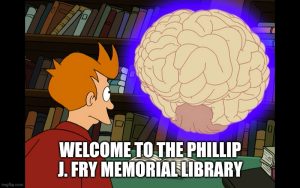
The world may be a vampire, but the evidence suggests we humans are hardwired for story. To quote the neuroscientist Antonio Damasio, “story is something brains do, naturally and implicitly.” It is the solution our brains arrived at to solve the problem of which of the 11,000,000 bits of sensory input per second to keep, cut or edit (Cron. 7-8).
We humans have been storytellers since perhaps even before we became homo sapiens sapiens. No matter our culture or language, we all teach, learn, and pass on warnings via story (Ibid). It is, as I said earlier, the language of experience, without which we humans wouldn’t have survived. However, it also enables us to form relationships with others and maintain community bonds. In an existence of navigating reality by proxy, shared stories create common ground. They’re the bricks and mortar of society itself.
Moreover, stories are “sticky” in ways that facts are not. Brain imaging studies have found that well-crafted narratives light up the same regions that process sights, sounds, tastes and movement in real life (Cron p.4). So you know, in addition to all of its other roles, story can also be a holodeck for our brains.
In case you were wondering, that hardwiring and felt experience are a large part of why people rarely change their minds when faced with new evidence. The rest we can mostly blame on cognitive bias and the incredible irony that lizard-brain-tickling narratives almost always DESTROY facts and logic.
But anyway…so far, so organic, right?
Well, that’s about to change.
How The Ersatz And Unwanted Slips In
Cognitive bias is one hell of a thing.
For decades, these biases were defined as errors in thinking arising from the busy-bee brain making shortcuts on the fly to simplify its job (usually related to memory). Relatable motivation, honestly. More recently though, researchers have found that those “errors” are entirely intentional.
It seems the brain has never prioritized accuracy when it comes to perception. Unsurprisingly, the goal has always been survival; that is the priority. If you’re not careful, your brain will edit/add to those inner libraries and fuck with the indexing. When you consider the fact that the brain can just edit obvious physical phenomena from your sensory input so you literally don’t perceive it, that’s actually quite disturbing.
(As an aside, this is why it’s especially important for those of us from minority religions to frame “reality” as a consensus of perception. We need to be aware of where the overcultural consensus ends and ours begin, and to be mindful of that line.)
Anyway, also in our Bear Grylls brain kit: an equally innate negativity bias. This little Swiss Army Knife of misery is why we tend to focus much more on negative experiences and media. So, not only do our brains proactively tweak perception to privilege survival regardless of accuracy, it also privileges the negative while doing so.
Remember those brain scans I mentioned earlier?
Well, according to other neuroscience studies, that negativity bias is as physical as it is emotional. Brain scans show greater neural activation to the negative than either the neutral or positive or neutral—a response induced not only by negative stimuli, but also by images, videos, words, and even risky visualized scenarios. Finally, those cognitive biases I began with at the top of this section? Well, I’m sure it’ll absolutely not surprise you to learn that fear appears to be the most fertile soil for those.
What do you get when you cross a survivalist with pessimism and a high level of anxiety?
You get an easy access point for an ersatz or unwanted reality to slip in.
Final Thoughts
When I first sat down to write this, I had something much shorter in mind. As it turns out, I’m far from done spilling words on this topic. However, attention is precious nowadays, and I’ve kept yours with this behemoth for long enough. It’s only fair that I give your eyeballs a break. (Worry not, the next post is mostly already written!)
In this post, I’ve talked a lot about perception, its mechanics and vulnerabilities. I’ll be digging further into those ersatz unrealities, the propagandist’s/marketer’s art, and its overlap with this thing we call “magic.” There’s also a possible third post in the works too, but more on that later.
For now though, if you find that you also thirst for the organic, then I encourage you to practice noticing your own easy access points and to sit with them. Consider how you might best shore up your defenses in a way that is both compassionate and respects your needs and the innate mechanisms of your brain.
However, most of all, I invite you to try reframing some of the news you see as stories in a book. What are the plot points? Who are the protagonists, and what drew them in? What is the prologue? Where might this story be going, and what emotions does it stir up?
Lastly, where are you in this story, who is doing the telling, and what might the storyteller or storytellers hope to achieve?
The Final, Final Words (No, Really)
I’m excited to share that I’ll be presenting at the Sacred Space/Between the Worlds 2026 joint conference in College Park, MD in February!
The Sacred Space Conference is the premier annual esoteric conference on the East Coast for intermediate to advanced practitioners. The Between the Worlds Conference is offered at particular intervals aligned with specific astrological events.
When these two conferences come together you can expect a wide variety of high caliber workshops and rituals designed to discuss important magical needs and timely topics.
Check out the schedule and register here ➡️ https://sacredspacebtw2026.sched.com/
That’s all from me for now. Please enjoy this bonus pic of Irene (who, again, is absolutely not Bernie Sanders) as a reward for making it this far.


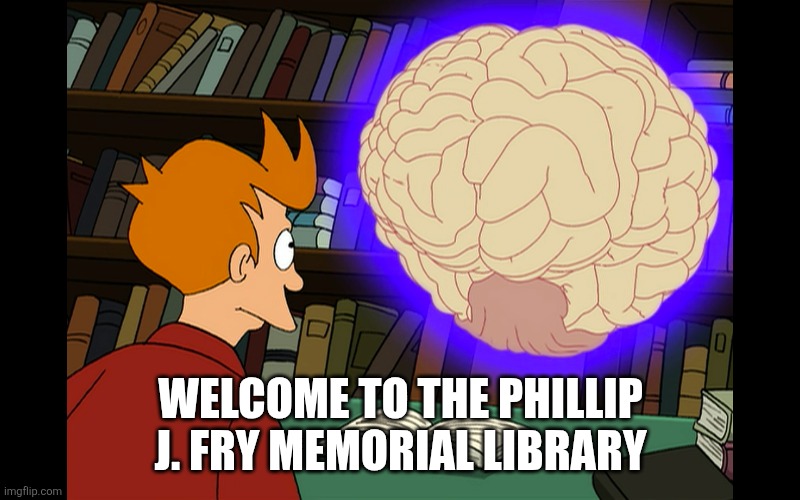











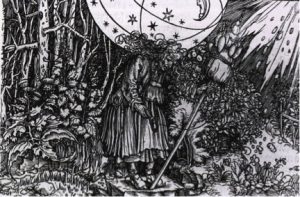




 children, but can be made safe with some adaptation. For example, the opened iron scissors hung over a crib can easily be a forged iron troll cross (or anything else that’s iron and not sharp) stuffed under the mattress of the child’s bed (or hung on the wall if the child is old enough), and we really don’t need to go back to testing our children to make sure they’re not changelings (by incidentally torturing or killing them).
children, but can be made safe with some adaptation. For example, the opened iron scissors hung over a crib can easily be a forged iron troll cross (or anything else that’s iron and not sharp) stuffed under the mattress of the child’s bed (or hung on the wall if the child is old enough), and we really don’t need to go back to testing our children to make sure they’re not changelings (by incidentally torturing or killing them).